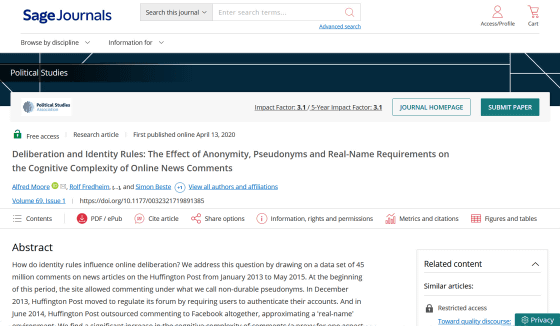Will the quality of discussions improve if we become an ``internet that requires real names''?

As discussions about various topics arise on the Internet every day, some people argue that ``the anonymous Internet cannot have constructive discussions, so real names should be required on the Internet.'' However, a study that analyzed discussions that occurred in three stages: 'complete anonymity,' 'anonymousness tied to a specific account,' and 'complete real name,' found that the most constructive discussions occurred at 'complete real name.' I know it wasn't a real name environment.
Deliberation and Identity Rules: The Effect of Anonymity, Pseudonyms and Real-Name Requirements on the Cognitive Complexity of Online News Comments - Alfred Moore, Rolf Fredheim, Dominik Wyss, Simon Beste, 2021

Online anonymity: study found 'stable pseudonyms' created a more civil environment than real user names
https://theconversation.com/online-anonymity-study-found-stable-pseudonyms-created-a-more-civil-environment-than-real-user-names-171374
Anonymity on the Internet is valuable because it allows people to speak out without fear of social or legal discrimination. For example, even if you belong to a religious community that oppresses sexual minorities, you can speak anonymously about your gender identity without fear.
On the other hand, some say that the anonymity of the Internet has a negative impact on the speech space, as it is possible to abuse the anonymity and use abusive language or slander to others from a safe distance. It has also been pointed out that anonymous spaces make it difficult to have civil and constructive discussions because people can say whatever they want without affecting their real lives.
A research team led by
During this research period, the Huffington Post changed from ``a state in which anyone can write comments anonymously in the comment section of an article (completely anonymous system)'' to ``a state in which anyone can write comments anonymously with an account registration system (registered anonymous system)'' '', and eventually became ``a state where comments can be written using a Facebook account, which is a real-name SNS (complete real-name system)''.
First, in the 'completely anonymous' state, users who were blocked by moderators could immediately change their names and post comments.
Therefore, Huffington Post introduced an account authentication system using Facebook accounts. As a result, although comments on articles can be posted anonymously, the platform can now identify individual accounts, and if a user is blocked for offensive behavior, they will not be able to create another account. .
Eventually, the Huffington Post outsourced its comment system itself to Facebook, and the username on the Huffington Post was replaced with the real name of the Facebook account. In other words, by examining the quality of comments in these three stages, it can be determined whether high-quality discussions were taking place in ``complete anonymity'', ``registered anonymity'', or ``complete real name''. That's why.

As a result of the analysis, it was found that the use of abusive language and offensive language decreased significantly when the system transitioned from ``complete anonymity'' to ``registered anonymity.'' Moore likens this finding to the ``
Furthermore, we analyze the characteristics of individual comments, such as word length, words that indicate a causal relationship (such as 'because'), and words that indicate a tentative conclusion (such as 'perhaps'), and analyze the 'cognitive complexity' of each comment. ' was measured. Cognitive complexity of comments is known to be a good indicator of meeting quality, although it cannot determine the context in which each comment occurred.
When examining changes in the cognitive complexity of comments, we found that the quality of comments was highest during the ``registered anonymity'' stage, and that the quality of discussions significantly improved after moving from ``complete anonymity''. It was shown that there was an improvement. However, when they moved from a ``registered anonymous system'' to a ``complete real name system,'' the quality of comments deteriorated. This result contradicts the idea that 'removing anonymity from the Internet space and moving to real names will enable high-quality discussions.'

The mechanism by which the quality of comments is highest under ``registered anonymity'' is unclear, but Moore says, ``One possibility is that under a fixed pseudonym, users primarily serve as an audience for ``fellow commentators.'' ” and, as has been suggested on other platforms, they will likely be more concerned about their reputation within the forum, whereas in a real-name environment, this dynamic 'It seems plausible that what you say might change when you make a comment that is visible not only to other HuffPost readers, but also to your Facebook friends.'
Moore points out that the important thing is not whether users are anonymous or real-name, but whether users are invested in their own 'persona' and are responsible for their actions on a particular forum. Even if the user does not use their real name, if each user is linked to a single account and their reputation goes up and down in conjunction with other comments and behavior, there is a possibility that polite and constructive comments will increase. It's possible.
◆Forum now open
A forum related to this article has been set up on the GIGAZINE official Discord server . Anyone can write freely, so please feel free to comment! If you do not have a Discord account, please create one by referring to the article explaining how to create an account!
• Discord | “Which is easier to discuss: “real name internet” or “anonymous internet”? ' | GIGAZINE
https://discord.com/channels/1037961069903216680/1219208347740409878
Related Posts:
in Web Service, Science, Posted by log1h_ik







